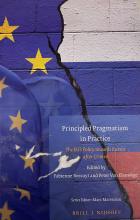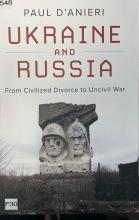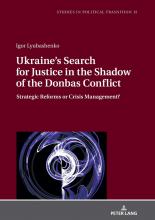This is a short survey of the works published on the causes and consequences of the Ukraine crisis, with a special focus on Russia’s relations with the West, in the form of an in-depth, annotated list in which attention is drawn to the most significant works available in the Peace Palace Library. Towards that end, it brings together publications of international relations scholars and area specialists. Issues covered include: the evolution of EU–Russia and US–Russia relations, the role of international law, strategic culture and ontological insecurities in the formation of Russian foreign policy, the role of hybrid warfare in Russian military policy, the geopolitical drivers of Russia’s Ukraine policy, and Russia’s annexation of Crimea and intervention in eastern Ukraine.
Highlights
The Ukrainian drama, which burst onto the headlines in autumn 2013, was one long and complex in its making. In contrast to other studies of the Ukrainian conflict, the present study examines in detail its historical background and complex causality-from the rise of the mass demonstrations on Kiev's Maidan to the making of the post-revolt Maidan regime. Two great schisms that shaped the Ukrainian crisis and their historical, cultural, and geopolitical causes are disected. One schism lay within Ukraine itself with western and southeastern Ukraine divided by different historical, ethnic, linguistic, religious, ideological, socioeconomic, and ultimately political and international orientations. The other - at the international level - was driven by geopolitical factors, real and conjured or `imagined.' Western-Russian competition for Ukraine - epitomized most by NATO and EU expansion to Russia's very borders - exacerbated Ukraine's internal divisions, setting the country aflame. New light is shed on the role of radical Ukrainian nationalists and neofascists in the February 2014 snipers' massacre, the ouster of President Viktor Yanukovych, and their less than democratic outcome as well as on Russia's seizure of Crimea and involvement in Donbass's civil war. Finally, the analysis puts the rise of the `new cold war' in context.
As the EU’s relations with Russia remain at an all-time low and continue to be in a state of paralysis, marked by de-institutionalisation, inertia and estrangement, the EU’s policy towards Russia seems up for review. By taking stock of the implementation of the EU’s Global Strategy and the five principles that are guiding EU-Russia relations, this volume provides a forward-looking angle and contributes to a better understanding of the current EU-Russia relationship and the prospects for overcoming the existing deadlock. By bringing together European and Russian scholars and adopting an interdisciplinary perspective that combines insights from EU studies, international relations, and European and international law, the book provides a comprehensive and holistic view on the state of affairs in EU-Russia relations.
D'Anieri explores the dynamics within Ukraine, between Ukraine and Russia, and between Russia and the West, that emerged with the collapse of the Soviet Union and eventually led to war in 2014. Proceeding chronologically, this book shows how Ukraine's separation from Russia in 1991, at the time called a 'civilized divorce', led to what many are now calling 'a new Cold War'. He argues that the conflict has worsened because of three underlying factors - the security dilemma, the impact of democratization on geopolitics, and the incompatible goals of a post-Cold War Europe. Rather than a peaceful situation that was squandered, D'Anieri argues that these were deep-seated pre-existing disagreements that could not be bridged, with concerning implications for the resolution of the Ukraine conflict. The book also shows how this war fits into broader patterns of contemporary international conflict and should therefore appeal to researchers working on the Russia-Ukraine conflict, Russia's relations with the West, and conflict and geopolitics more generally.
Should we punish wrongdoers? Should we take care of the ones who suffered from wrongdoings? Although we may believe answers to these questions are obvious, they become less so when similar questions are asked under exceptional circumstances, such as armed conflicts. These answers may decide about the continuation of hostilities or their end. The stakes are high, while we can hardly ignore the need to deal with the consequences of violence generated by a conflict. This book discusses the dilemmas and challenges associated with the provision of justice in the context of the armed conflict in Ukrainian Donbas in 2014–2019.
Other selected books and articles
In our Catalogue you will find books, articles, essays, and documents on this subject, both in physical and electronic format. To facilitate your research we have created the following links by using various (combinations of) keywords.
- "Crimea" [411 hits]
- "Donbas Region" [19 hits]
- "Russia" AND "Ukraine" [689 hits]
- "Russia" AND "European Union" [709 hits]
- "Ukraine" AND "European Union" [262 hits]
International courts cases
- [International Court of Justice] Allegations of Genocide under the Convention on the Prevention and Punishment of the Crime of Genocide (Ukraine v. Russian Federation)
This Application concerns a dispute between Ukraine and the Russian Federation relating to the interpretation, application and fulfilment of the 1948 Convention on the Prevention and Punishment of the Crime of Genocide (the “Genocide Convention”). As Ukraine further explains, the Russian Federation has falsely claimed that acts of genocide have occurred in the Luhansk and Donetsk oblasts of Ukraine, and on that basis recognized the so-called “Donetsk People’s Republic” and “Luhansk People’s Republic,” and then declared and implemented a “special military operation” against Ukraine with the express purpose of preventing and punishing purported acts of genocide that have no basis in fact. On the basis of this allegation, Russia is now engaged in a military invasion of Ukraine involving grave and widespread violations of the human rights of the Ukrainian people. Ukraine emphatically denies that any such genocide has occurred and brings this Application to establish that Russia has no lawful basis to take action in and against Ukraine for the purpose of preventing and punishing any purported genocide.
ICJ documents; PPL keyword: Allegations of Genocide under the Convention on the Prevention and Punishment of the Crime of Genocide (Ukraine v. Russian Federation)
- [International Court of Justice] Application of the International Convention for the Suppression of the Financing of Terrorism and of the International Convention on the Elimination of All Forms of Racial Discrimination (Ukraine v. Russian Federation)
On January 16th, 2017, Ukraine filed a claim with the International Court of Justice requesting the court to initiate proceedings against Russia. Ukraine is accusing Russia of violating the Convention on the suppression of financing terrorism, and the International convention on elimination on all forms of racial discrimination. Ukraine wants not just for the court to order Russia to stop financing terrorists or to stop violating the rights of Crimean Tatars, but also the highest judicial authority within the UN system to recognize that Russia is financing the terrorist in eastern Ukraine, and indeed is violating Human rights of the Crimean Tatars in Crimea.
ICJ documents; PPL keyword: Application of the International Convention for the Suppression of the Financing of Terrorism and of the International Convention on the Elimination of All Forms of Racial Discrimination (Ukraine v. Russian Federation)
- [International Tribunal for the Law of the Sea] Case concerning the detention of three Ukrainian naval vessels (Ukraine v. Russian Federation), Provisional Measures
By its Notification and Statement of Claim dated 31 March 2019, Ukraine instituted arbitral proceedings under Annex VII to the Convention against the Russian Federation in a dispute concerning “the immunity of three Ukrainian naval vessels and the twenty-four servicemen on board”. Pending the constitution of the arbitral tribunal and after the expiry of the two-week time limit provided for by article 290, paragraph 5, of the Convention, Ukraine, on 16 April 2019, submitted to the Tribunal a request for the prescription of provisional measures in respect of the dispute. The case was entered in the Tribunal’s list of cases as Case No. 26. By note verbale dated 30 April 2019, the Russian Federation informed the Tribunal “of its decision not to participate in the hearing on provisional measures in the case instituted by Ukraine”. By an Order dated 2 May 2019, the President fixed 10 May 2019 as the date for the hearing. By note verbale dated 7 May 2019, the Russian Federation transmitted a memorandum regarding its position on the circumstances of the case. Prior to the opening of the hearing, the Tribunal held initial deliberations on 9 May 2019. Oral statements were presented at a public sitting held on 10 May 2019. In accordance with article 75, paragraph 2, of the Rules, the Agent of Ukraine presented the final submissions at the hearing on 10 May 2019. The Tribunal delivered its Order on 25 May 2019. Ukraine submitted its initial report on Compliance with the Provisional Measures Prescribed on 25 June 2019 and a supplementary report on 26 June 2019. The Russian Federation submitted a report on 25 June 2019. Subsequently, Ukraine submitted communications concerning the case on 13 August 2019, 18 September 2019 and 29 November 2019, whereas the Russian Federation submitted notes verbales concerning the case dated 16 September 2019 and 22 November 2019.
ITLOS documents; PPL keyword: Case concerning the detention of three Ukrainian naval vessels (Ukraine v. Russian Federation), Provisional Measures
Blogs
- Russia’s Threat to Ukraine a Violation of International Law, February 4, 2022 by Anne Peters → Russia’s Threat to Ukraine a Violation of International Law - Max Planck Law (mpg.de)
- Russia-Ukraine: Resolving the World’s Most Dangerous Conflict, February 1, 2022 by Mary Ellen O'Connell → Russia-Ukraine: Resolving the World’s Most Dangerous Conflict – EJIL: Talk! (ejiltalk.org)
- Russian Actions against Ukraine violate International Law, January 27, 2022 by Cesar Chelala → Russian actions against Ukraine violate international law | Cesar Chelala | The Blogs (timesofisrael.com)
- The Death of the Prohibition on the Use of Force: An Attempt at Reimagination, February 15, 2021 by Jan-Phillip Graf → The Death of the Prohibition on the Use of Force - Völkerrechtsblog (voelkerrechtsblog.org)
- International Law may yet contain Putin in Ukraine, February 4, 2020 by Michel Waelbroeck and Willem Aldershoff → International law may yet contain Putin in Ukraine - Atlantic Council
- Peaceful’ and ‘remedial’ annexations of Crimea, January 19, 2018 by Tero Lundstedt → ‘Peaceful’ and ‘remedial’ annexations of Crimea - Völkerrechtsblog (voelkerrechtsblog.org)
- Ukraine v. Russia: Passage through Kerch Strait and the Sea of Azov: Part III: The jurisdiction of the Arbitral Tribunal, January 15, 2018 by Valentin J. Schatz and Dmytro Koval → Ukraine v. Russia: Passage through Kerch Strait and the Sea of Azov - Völkerrechtsblog (voelkerrechtsblog.org)
- Ukraine v. Russia: Passage through Kerch Strait and the Sea of Azov: Part II: Ukraine’s rights of passage through Kerch Strait, January 12, 2018 by Valentin J. Schatz and Dmytro Koval → Ukraine v. Russia: Passage through Kerch Strait and the Sea of Azov - Völkerrechtsblog (voelkerrechtsblog.org)
- Ukraine v. Russia: Passage through Kerch Strait and the Sea of Azov: Part I: The legal status of Kerch Strait and the Sea of Azov, January 10, 2018 by Valentin J. Schatz and Dmytro Koval → Ukraine v. Russia: Passage through Kerch Strait and the Sea of Azov - Völkerrechtsblog (voelkerrechtsblog.org)



